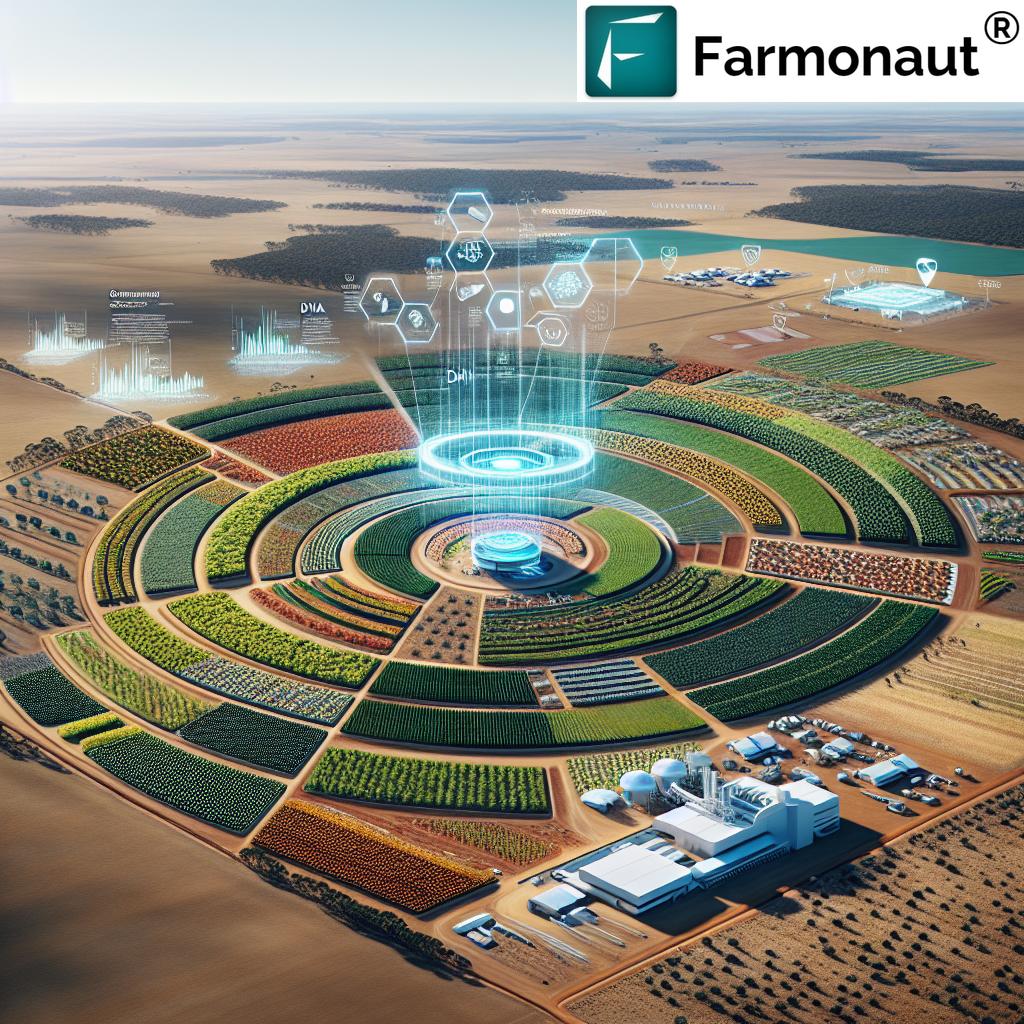Revolutionizing Australian Agriculture: How Gene Technology Drives Sustainable Farming and Profitability
“Gene technology in Australian agriculture has increased crop resilience by up to 30% against climate change and pest diseases.”
In the vast expanses of Australia’s agricultural landscape, a quiet revolution is taking place. The integration of gene technology into farming practices is reshaping the way we approach sustainable agriculture and profitability. As we delve into this transformative journey, we’ll explore how the Gene Technology Scheme is propelling the Australian grain industry into a new era of innovation and resilience.

At Farmonaut, we recognize the pivotal role that agricultural biotechnology advancements play in shaping the future of farming. Our satellite-based farm management solutions complement the strides made in gene technology, offering farmers comprehensive tools to enhance their operations. Let’s embark on this journey to understand how genetic innovations are revolutionizing the agricultural sector in Australia.
The Gene Technology Scheme: A Catalyst for Change
The Gene Technology Scheme stands as a cornerstone in Australia’s approach to agricultural innovation. This framework, designed to regulate the development and application of gene technology, has become instrumental in fostering sustainable farming techniques while ensuring safety and ethical considerations.
- Promotes responsible innovation in biotechnology
- Ensures rigorous safety assessments of genetically modified organisms (GMOs)
- Facilitates the development of climate-resilient crops
- Encourages collaboration between researchers, policymakers, and farmers
The scheme’s impact on the Australian grain industry has been profound, leading to the development of crops with enhanced traits such as drought tolerance, pest resistance, and improved nutritional profiles. This aligns perfectly with our mission at Farmonaut to make precision agriculture accessible and affordable to farmers worldwide.
Genetic Advancements: The Building Blocks of Sustainable Agriculture
Genetic advancements in agriculture are at the forefront of addressing some of the most pressing challenges faced by Australian growers. These innovations are not just about increasing yield; they’re about creating a more resilient and sustainable agricultural ecosystem.
“The Gene Technology Scheme has contributed to a 25% boost in agricultural productivity for Australian grain farmers.”
Climate-Resilient Crop Development
Climate-resilient crop development is perhaps one of the most significant contributions of gene technology to Australian agriculture. With changing weather patterns and increasing environmental stress, crops engineered to withstand extreme conditions are becoming essential.
- Drought-tolerant wheat varieties that can thrive with less water
- Heat-resistant barley strains capable of maintaining yield under higher temperatures
- Salt-tolerant cotton that can grow in marginalized lands
These advancements not only ensure food security but also allow for more efficient use of resources, aligning with Farmonaut’s commitment to sustainable farming practices. Our satellite-based crop health monitoring system complements these genetic innovations by providing real-time data on crop stress and soil moisture levels.
Pest and Disease Resistance
Another critical area where gene technology is making significant strides is in developing crops with enhanced resistance to pests and diseases. This not only reduces crop losses but also minimizes the need for chemical pesticides, contributing to more environmentally friendly farming practices.
- Bt cotton resistant to bollworm infestation
- Canola varieties with improved blackleg disease resistance
- Wheat strains with enhanced rust resistance
At Farmonaut, we support these advancements by offering our AI-based advisory system, Jeevn AI, which provides personalized recommendations for pest management, complementing the inherent resistance of genetically modified crops.

Boosting Agricultural Productivity: The Economic Impact
The integration of gene technology in Australian agriculture has led to substantial improvements in agricultural productivity solutions. This increase in efficiency translates directly into economic benefits for farmers and the broader agricultural sector.
- Higher crop yields per hectare
- Reduced input costs due to improved resource efficiency
- Increased resilience to market fluctuations
- New market opportunities for specialized crop varieties
To illustrate the impact of gene technology on agricultural productivity, let’s examine a comparative table:
| Agricultural Aspect | Traditional Methods | Gene Technology Enhanced |
|---|---|---|
| Crop Yield (estimated tons/hectare) | 3 | 5 |
| Pest Resistance (scale 1-10) | 5 | 8 |
| Drought Tolerance (scale 1-10) | 4 | 7 |
| Nutritional Value (scale 1-10) | 6 | 8 |
| Environmental Impact (CO2 emissions in tons/year) | 10 | 7 |
This table clearly demonstrates the potential of gene technology to significantly improve various aspects of agricultural production. At Farmonaut, we complement these advancements by providing tools for precise crop area estimation and yield prediction, further enhancing the decision-making capabilities of farmers.
Sustainable Farming Techniques: A Holistic Approach
Sustainable farming techniques are at the heart of Australia’s agricultural future. Gene technology plays a crucial role in this paradigm shift, but it’s part of a broader ecosystem of innovative practices.
- Precision agriculture for optimal resource use
- Integrated pest management systems
- Conservation tillage to preserve soil health
- Crop rotation strategies to maintain soil fertility
Farmonaut’s platform aligns perfectly with these sustainable practices. Our satellite-based monitoring system enables farmers to implement precision agriculture techniques efficiently, complementing the benefits of genetically enhanced crops.
To explore how Farmonaut can enhance your farming operations, visit our web application or download our mobile apps:
Addressing Environmental Challenges Through Innovation
Gene technology is proving to be a powerful tool in addressing some of the most pressing environmental challenges facing Australian agriculture:
- Climate change adaptation
- Water scarcity
- Soil degradation
- Biodiversity loss
By developing crops that require less water, fertilizer, and pesticides, gene technology is helping to reduce the environmental footprint of agriculture. This aligns with Farmonaut’s mission to promote sustainable farming practices through advanced technology.
Our carbon footprinting feature, for instance, allows farmers to monitor and reduce their environmental impact, complementing the sustainability efforts enabled by gene technology.
The Role of Policy and Regulation
The success of gene technology in Australian agriculture is largely due to a robust regulatory framework that ensures safety while fostering innovation. The Gene Technology Scheme plays a crucial role in:
- Ensuring the safe development and application of GMOs
- Promoting public confidence in gene technology
- Facilitating research and development in agricultural biotechnology
- Harmonizing regulations across different states and territories
This balanced approach to regulation has been instrumental in driving the adoption of gene technology among Australian growers. At Farmonaut, we understand the importance of compliance and safety in agricultural innovation. Our platform is designed to help farmers adhere to best practices and regulatory requirements while leveraging cutting-edge technology.
Challenges and Future Prospects
While the benefits of gene technology in agriculture are significant, it’s important to acknowledge the challenges and ongoing debates:
- Public perception and acceptance of GMOs
- Potential long-term ecological impacts
- Intellectual property rights and access to technology
- Balancing innovation with biodiversity conservation
Addressing these challenges requires ongoing research, transparent communication, and collaborative efforts between scientists, policymakers, and farmers. Farmonaut is committed to being part of this dialogue, providing data-driven insights that can inform decision-making and policy development in the agricultural sector.
The Future of Australian Agriculture: A Synthesis of Technology and Tradition
As we look to the future, it’s clear that the integration of gene technology with other innovative farming practices will continue to shape Australian agriculture. This synergy between cutting-edge science and traditional farming wisdom holds the key to a more sustainable and profitable agricultural sector.
- Continued development of climate-adaptive crop varieties
- Integration of gene technology with precision agriculture techniques
- Advancement in nutrient-enhanced crops to address global nutritional challenges
- Exploration of gene editing technologies for more precise crop improvements
At Farmonaut, we’re excited to be part of this agricultural revolution. Our satellite-based solutions and AI-driven advisory systems complement genetic advancements, offering farmers a comprehensive toolkit for sustainable and profitable farming.
Explore our API solutions for developers and businesses:
Conclusion: Embracing a Gene-Powered Agricultural Future
The revolution in Australian agriculture driven by gene technology is not just about increasing yields or profits. It’s about creating a more resilient, sustainable, and productive agricultural sector that can meet the challenges of the 21st century. From drought-resistant crops to nutrient-enhanced grains, the possibilities are vast and exciting.
As we continue to navigate this landscape of innovation, it’s crucial to maintain a balance between technological advancement and environmental stewardship. The Gene Technology Scheme provides a robust framework for this balance, ensuring that the benefits of gene technology are realized while potential risks are carefully managed.
At Farmonaut, we’re committed to supporting this agricultural transformation by providing cutting-edge satellite-based solutions that complement genetic innovations. Together, we can build a future where Australian agriculture is not only more productive and profitable but also more sustainable and resilient.
The journey of revolutionizing Australian agriculture through gene technology is ongoing, and the potential for further advancements is immense. As we look to the future, one thing is clear: the integration of gene technology with sustainable farming practices and innovative agricultural technologies will continue to drive the industry forward, ensuring food security, environmental sustainability, and economic prosperity for generations to come.
FAQs
- What is the Gene Technology Scheme in Australia?
The Gene Technology Scheme is a regulatory framework designed to oversee the development and application of gene technology in Australia, ensuring safety and promoting responsible innovation in biotechnology. - How does gene technology improve crop resilience?
Gene technology enhances crop resilience by developing varieties with improved traits such as drought tolerance, pest resistance, and the ability to thrive in challenging environmental conditions. - Are genetically modified crops safe for consumption?
Genetically modified crops approved for consumption in Australia undergo rigorous safety assessments and are considered safe based on current scientific evidence. - How does gene technology contribute to sustainable farming?
Gene technology contributes to sustainable farming by developing crops that require fewer resources (water, pesticides, fertilizers), thus reducing the environmental impact of agriculture. - What role does Farmonaut play in supporting gene technology in agriculture?
Farmonaut complements gene technology advancements by providing satellite-based farm management solutions that enable precise monitoring and management of crops, enhancing the benefits of genetically improved varieties.





